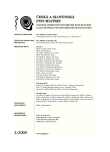-
Medical journals
- Career
Prediction of Efficacy of Inpatient Treatment in Metamphetamine Dependence
Authors: L. Hosák 1; L. Csémy 2; M. Preiss 2; Eva Čermáková 3
Authors‘ workplace: Psychiatrická klinika LF UK a FN, Hradec Králové ; přednosta prof. MUDr. J. Libiger, CSc. Psychiatrická klinika 3. LF UK a Psychiatrické centrum Praha 1; přednosta prof. MUDr. C. Höschl, DrSc. Ústav lékařské biofyziky LF UK, oddělení výpočetní techniky, Hradec Králové 2; přednosta prof. MUDr. P. Stránský, CSc. 3
Published in: Čes. a slov. Psychiat., 101, 2005, No. 2, pp. 82-87.
Category: Original Article
Overview
Dependence on metamphetamine (pervitine) represents a serious medical and social problem in the Czech Republic. The estimated number of metamphetamine abusers is 22 000. The issue of a prediction of efficacy of an inpatient treatment in metamphetamine dependence is not described sufficiently in the literature. The goal of our study was to assess, whether the examination of the patient’s personality and complex problems brought by the substance abuse may predict a success of the inpatient treatment in a one-year follow-up. Forty-one patients (women N = 12) at the average age of 24.0 ± 3.9 years who have abused metamphetamine for 5.9 years on the average, hospitalized in the Hospital for Treatment of Substance Dependence in Nechanice in the period from September 1, 2002 to March 31, 2003 were the study subjects. We examined the patients using the TCI personality questionnaire and the EuropASI questionnaire during the first month of the hospitalization. We assessed the abstinence of the study subjects by mail one year after they had been discharged from the hospital. Sixteen patients (women N = 8) which represent 39 % of the total study population proclaimed to have completely abstained from metamphetamine. The abstaining patients scored significantly higher in the cooperativeness dimension of the TCI questionnaire (28.8 ± 6.7 vs 24.3 ± 6.9, p = 0.04, t-test) and the total of problems due to substance abuse according to the EuropASI questionnaire (31.1 ± 6.6 vs 25.9 ± 8.1, p = 0.04, Mann-Whitney test) as compared with the subjects who continued to abuse metamphetamine. This means that a patient with good social skills, and a sufficient motivation to abstain may achieve good treatment results. The motivation may be based on problems, associated with the substance abuse.
Key words:
metamphetamine, dependence, treatment, prediction, personality, problems.
Labels
Addictology Paediatric psychiatry Psychiatry
Article was published inCzech and Slovak Psychiatry

2005 Issue 2-
All articles in this issue
- Psychosocial Stressors in Young Families from Brno and Znojmo Part II
- Prediction of Efficacy of Inpatient Treatment in Metamphetamine Dependence
- Pesso Boyden Psychomotor Therapy in the Treatment of Traumatized in Patients, Survivors of Second World War in the Former Dutch East Indies
- Safety and Tolerability of Second and Third Generation Antipsychotics
- Contribution to the Discussion about Dissociative States, Taking into Consideration the Work of Pierre Janet (1859 – 1947)
- Inpatient Treated for Addictive Diseases at Psychiatric Hospital Prague Bohnice 1994 – 2003
- Czech and Slovak Psychiatry
- Journal archive
- Current issue
- Online only
- About the journal
Most read in this issue- Safety and Tolerability of Second and Third Generation Antipsychotics
- Prediction of Efficacy of Inpatient Treatment in Metamphetamine Dependence
- Psychosocial Stressors in Young Families from Brno and Znojmo Part II
- Pesso Boyden Psychomotor Therapy in the Treatment of Traumatized in Patients, Survivors of Second World War in the Former Dutch East Indies
Login#ADS_BOTTOM_SCRIPTS#Forgotten passwordEnter the email address that you registered with. We will send you instructions on how to set a new password.
- Career

